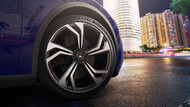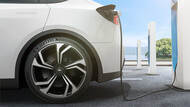
(1) Internal noise measurement, done in 2016 on size 245/45 R19 on KIA Cadenza. Noise level measured in the range "170-230Hz". Results may vary according to vehicle, tyres range and size, speed and road conditions.

Discover everything you need to know on suitable tyres for electric vehicles, and how they contribute to range, energy consumption and the overall driving experience.
Electric cars have heavy batteries, so they need tyres which can carry the extra weight. While the battery stores the energy, it’s the electric motor that provides the instant torque (and no sound inside the car!). With an electric vehicle, as soon as you press the accelerator, you immediately deploy 100% of the vehicle’s power. This means weight transfers are sharper, and a lot more intense than with a combustion-powered vehicle. This also affects the impact on wear and tear of the tyres.
No worries there: MICHELIN tyres take this into account, mostly in the structure of the tyres and its materials.
The second characteristic is noise. An electric car is silent, right? Without the noise of a combustion engine, the sound of the tyres on the road surface is much more noticeable in an electric car. So, manufacturers have to create tyres that are far quieter. Thus, perceived interior noise is reduced. For example: in an orchestra, when you have a drum and a flute playing at the same time you mostly hear the drum. But when the drum stops, the sound of the flute appears more clearly. The same happens when switching to an electric vehicle: the thermal engine which generates most of the noise is replaced by an almost-silent electric motor, and the noise of the tyres is more apparent.
For this reason, our innovative MICHELIN Acoustic technology found in some of our tyres, reduces the perceived noise level inside the car by up to 20%.(1) This makes your driving experience much more enjoyable, especially on the motorway.
The third characteristic specific to electric cars is the battery and its range, which needs to be taken into account, especially on long trips. Through rolling resistance, tyres contribute to electric consumption. As we'll see below, our tyres perform very well in this area.

Fitting your EV with suitable tyres ensures you get optimal battery range.
How do tyres improve range? Keep in mind that to move an object, you need to give it energy. And between the energy it receives and the energy it gives back in the form of movement, there is always some loss, dissipated as heat, because the tyre must relay some energy to the ground. This is called rolling resistance.
At Michelin, we develop our tyres so as to limit this energy loss in order to optimise energy efficiency and reduce unnecessary energy consumption. And, when it comes to electric vehicles, the more energy is optimised, the more range the vehicle has to play with!
In other words, you can drive longer on a single charge.
The major difference between electric cars and internal combustion engine cars, is the dynamic load transfers and increased torque linked to this specific kind of engine. This is a challenge for manufacturers because the mass and the torque increase require tyres with more lateral rigidity (cornering stiffness), to maintain the handling sensation at an important level, a strong grip for maximum acceleration, and plenty of longevity to minimise wear mile after mile.
Battery weight is an important issue for electric sports cars. If you have a powerful electric motor, you need to have a powerful battery, and this results in weight. 400kg is the average weight for a battery in an electric sports car.
Today car makers propose two kinds of electric vehicles:
In the case of regular vehicle retrofitted, usually tyre sizes daoes not change much compared to ICE (Internal Combustion Engine). Thus, tyres on retrofitted electric vehicles may wear faster than they did when they had an engine.
For brand new platform electric vehicles, mass and torque are considered from the beginning, tyre size is adjusted and is usually taller and sometimes narrow than the equivalent ICE tyres. Thus, the tyre wear on this EV will be similar to its equivalent ICE.
While all MICHELIN tyres are suitable for EV, some respond to specific driving demands.
A driver of a sports car wants fast acceleration, great torque transmission and high precision at the steering wheel. If you are such a driver, then MICHELIN Pilot Sport EV, specifically designed for these needs, is a great choice for you.
A driver of a sedan is more likely to prioritise safety and driving comfort. If you can relate to this profile, then you can opt for the MICHELIN e.Primacy which has been designed for drivers like you.

As for any other tyres, there are two main ways you can protect your EV tyres and thereby optimise their lifetime: maintenance and driving style.
EV tyres maintenance involves monitoring the pressure, alignment and wear. The pressure should be adapted depending on the load being carried. But how to find out the ideal tyre pressure? It’s simple! Cars feature a sticker from the manufacturer, often inside the driver’s door or fuel cap, which indicates the recommended pressure for specific tyre sizes. There are also recommendations according to whether the car is loaded or not.
Eco-driving is an expression we hear more and more these days, and with good reason. With the objective of reducing energy consumption, the right driving style not only maximises the range of an electric vehicle, it also optimises tyre quality and performance.
In summary, driving style is particularly important to maximising the life of your tyres. Use moderate acceleration and gentle, regenerative braking. Take corners carefully. That’s the best way to extend both battery range, and the longevity of your EV tyres.
Ultimately, we’re sure you’ll find the right tyre that fits your car and driving style with the help of your dealer and MICHELIN tyre selector.
LEGAL MENTIONS
(1) Internal noise measurement, done in 2016 on size 245/45 R19 on KIA Cadenza. Noise level measured in the range "170-230Hz". Results may vary according to vehicle, tyres range and size, speed and road conditions.